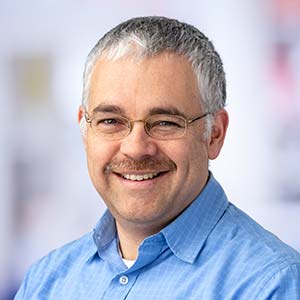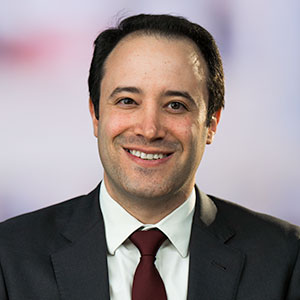Fred Hutch Cancer Center is at the forefront of research and developing new treatments for multiple myeloma. Our researchers pioneered blood and marrow transplant (BMT), which is one of the most significant advances in treating multiple myeloma, lymphoma and other blood cancers.
Fred Hutch researchers continue to study and improve BMT for multiple myeloma, too, making it safer and more effective. We also pioneered the mini-transplant, a gentler version of transplant that is appropriate for some patients and reduces radiation exposure.
Multiple Myeloma Clinical Trials
Fred Hutch typically has over 750 active cancer clinical trials enrolling participants.
Clinical trials may allow some patients access to a promising new treatment, and help physicians and researchers learn more about a disease.
Multiple Myeloma Research
Our multiple myeloma research begins in the laboratory, where we study the biology of myeloma cells and test and develop potential new drugs and immunotherapies. It also includes clinical research in which our scientists test new methods for treating and caring for myeloma patients. This work spans years and decades as we track survivors’ quality of life after treatment.
Our Multiple Myeloma Researchers and Faculty
Our interdisciplinary researchers and clinicians work together to prevent, diagnose and treat multiple myeloma as well as other cancers and diseases.
Fred Hutch scientists are world experts on the complications of blood and marrow transplants, including infections and graft-versus-host disease. They are learning how these complications occur and developing better methods to prevent and treat them.

Rahul Banerjee, MD, FACP
Rahul Banerjee, MD, FACP
Assistant Professor, Clinical Research Division, Fred Hutch
3 more appointments

Christopher D. Blosser, MD
Christopher D. Blosser, MD
Professor, Clinical Research Division, Fred Hutch
Director, Cancer and Organ Transplant Clinic, Fred Hutch
4 more appointments

Delphine Chen, MD
Delphine Chen, MD
Professor, Clinical Research Division, Fred Hutch
Director, Molecular Imaging and Therapy, Fred Hutch
3 more appointments

Kara Cicero, MD, MPH
Kara Cicero, MD, MPH
Assistant Professor, Clinical Research Division, Fred Hutch

Ann Dahlberg, MD

Madhav Dhodapkar, MBBS
Madhav Dhodapkar, MBBS
Professor, Translational Science and Therapeutics Division, Fred Hutch
Scientific Director, Multiple Myeloma Program, Fred Hutch
4 more appointments

Lawrence Fong, MD
Lawrence Fong, MD
Scientific Director, Immunotherapy Integrated Research Center (IIRC), Fred Hutch
Professor, Translational Science and Therapeutics Division, Fred Hutch
5 more appointments
Lab Website
Geoffrey Hill, MD, FRACP, FRCPA
Geoffrey Hill, MD, FRACP, FRCPA
Senior Vice President and Director, Translational Science and Therapeutics Division, Fred Hutch
Professor, Translational Science and Therapeutics Division, Fred Hutch
5 more appointments
Lab Website
Leona Holmberg, MD, PhD

Lorenzo Iovino, MD, PhD
Lorenzo Iovino, MD, PhD
Assistant Professor, Clinical Research Division, Fred Hutch
Member, Translational Data Science Integrated Research Center (TDS IRC), Fred Hutch
3 more appointments

Noam E. Kopmar, MD

Emily C. Liang, MD

David G. Maloney, MD, PhD
David G. Maloney, MD, PhD
Professor Emeritus, Translational Science and Therapeutics Division, Fred Hutch
Member, Immunotherapy Integrated Research Center (IIRC), Fred Hutch
1 more appointment

Marco Mielcarek, MD
Marco Mielcarek, MD
Professor, Clinical Research Division, Fred Hutch
Medical Director, Adult Blood and Marrow Transplantation, Fred Hutch
2 more appointments

Johnnie José Orozco, MD, PhD
Johnnie José Orozco, MD, PhD
Associate Professor, Translational Science and Therapeutics Division, Fred Hutch
Member, Immunotherapy Integrated Research Center (IIRC), Fred Hutch
2 more appointments
Lab Website
Andrew Jay Portuguese, MD
Andrew Jay Portuguese, MD
Assistant Professor, Clinical Research Division, Fred Hutch

Brenda Sandmaier, MD
Brenda Sandmaier, MD
Professor and Deputy Director, Translational Science and Therapeutics Division, Fred Hutch
Member, Immunotherapy Integrated Research Center (IIRC), Fred Hutch
2 more appointments

Masumi Ueda Oshima, MD, MA
Masumi Ueda Oshima, MD, MA
Associate Professor, Clinical Research Division, Fred Hutch
2 more appointments

Edus Houston Warren, MD, PhD
Edus Houston Warren, MD, PhD
Professor, Translational Science and Therapeutics Division, Fred Hutch
Professor, Vaccine and Infectious Disease Division, Fred Hutch
6 more appointments
Lab Website

